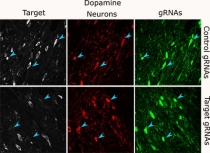The scientific world has advanced immeasurably by the science of DNA and genetics. Manipulating gene expression to change the way that cells such as neurons function has helped scientists create very specific tools to use for understanding and developing treatments for human diseases. For human brain disorders, like addiction, rats are the preferred animal model for behavioral studies due to their ability to learn a wide variety of complex behaviors, but targeted genetic tools have not been easily incorporated into these studies. The emergence of a gene editing technology called CRISPR-Cas9 has expanded our ability to make modifications to many species, including agricultural crops and rodents, but there are still limitations to its use.
The left side received control gRNAs which are present in both dopaminergic neurons (red) and non-dopaminergic neurons. The right side gRNAs were directed to a target gene (white) that is present on many cell types, but only the dopaminergic neurons lost the target gene.
In a paper published in the journal Neuron, NIH funded scientists describe the development of a new set of transgenic tools ─ technologies that allow for more robust gene editing. These include novel viral vectors (tools commonly used to deliver genetic material into cells) and, in an important contribution to the field, new transgenic rat lines ─ rats that are already modified at the earliest stages of cellular life. One component of this toolkit represents the first transgenic rat made using CRISPR in spermatogonial stem cells (at a very early stage of development) and opens up new possibilities for future transgenic rat types.
The novel viral vectors and transgenic rats described in this study can be combined to enable complex genomic editing in the adult rat brain. The process used by the team of scientists is extraordinarily complex and provides new molecular machinery to potentially alter the DNA code, opening new avenues for the treatment of brain diseases like substance use disorder or Parkinson’s, thought out of reach just a decade ago.
The study was supported by the National Institute on Drug Abuse and the National Institute of Mental Health, with work done by intramural scientists at those institutions, part of the National Institutes of Health. Other investigators were from the University of Texas and the University of Helsinki.
For a copy of the paper, published in Neuron, go to Neuron-specific genome modification in the adult rat brain using CRISPR-Cas9 transgenic rats.
For more information on genetics and addiction, go to: DrugFacts: Genetics and Epigenetics of Addiction.
For more information, contact the NIDA press office at media@nida.nih.gov or 301-443-6245. Follow NIDA on Twitter and Facebook.
NIDA Press Office
301-443-6245
media@nida.nih.gov
About the National Institute on Drug Abuse (NIDA): NIDA is a component of the National Institutes of Health, U.S. Department of Health and Human Services. NIDA supports most of the world’s research on the health aspects of drug use and addiction. The Institute carries out a large variety of programs to inform policy, improve practice, and advance addiction science. For more information about NIDA and its programs, visit www.nida.nih.gov.
About the National Institutes of Health (NIH): NIH, the nation’s medical research agency, includes 27 Institutes and Centers and is a component of the U.S. Department of Health and Human Services. NIH is the primary federal agency conducting and supporting basic, clinical, and translational medical research, and is investigating the causes, treatments, and cures for both common and rare diseases. For more information about NIH and its programs, visit www.nih.gov.
NIH…Turning Discovery Into Health®

